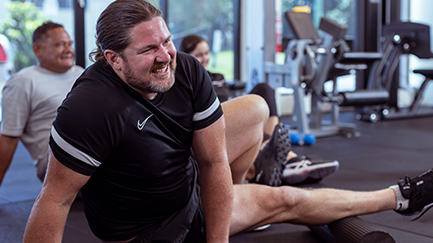
Supporting veterans through service related injuries
The Mates4Mates physical rehabilitation team is here to help veterans improve mobility, manage pain and enhance their overall wellbeing.

Commemoration days are an important time to reflect on the sacrifice and service of ex-serving and current military personnel, but they can also be a difficult time for veterans and family members.
Memorial events can bring up traumatic memories, renewing feelings of anxiety, sadness and grief for members of the Defence community. They can serve as a reminder of the people they have lost, injuries they may have sustained during service or feeling as if they are undeserving of these commemorative accolades.
Why veterans might struggle with memorial events
Mental health professionals often see an exacerbation of PTSD symptoms, anxiety and depression in the lead up and on the day of these events. Often, there may be an increase in prescriptions medication or substance use as a coping mechanism.
Veterans may also develop feelings of guilt and surround themselves with negative self-talk, which can see an increase in isolation, anger outbursts and increased hypervigilance.
Looking after yourself during commemoration days and memorial events
Be kind to yourself: there is no correct way to commemorate, so if you don’t feel up to attending a service then that is okay. Remember, as real as thoughts and memories can feel, that is all they are. They do not serve as facts.
Stay connected to others: this may not be face-to-face, but can include text messages, emails or phone calls. Spend time with the people who bring you a sense of calm and you feel you can talk to.
Limit news and social media exposure: news coverage of the events on TV and social media has the potential to be triggering. If you need to, try reducing your screentime during these periods of the year to benefit your mental health and wellbeing.
Engage in positive, meaningful activities: even if you don’t feel like it, getting sunlight and spending quality time with family or in nature can help shift our mood in a positive way.
Supporting veterans and their family members
It is important to remember that memorial events and commemoration days can bring up complex feelings for members of the Defence community. If someone close to you needs support around these times, it can help to have patience and validate that it can be difficult.
Recognise that while you may be proud of a veteran close to you, they may struggle to accept it. Have an open discussion about what support they need from you and how you want to manage the day as a family. This may also be applicable to family members of current-serving military personnel.
Support at Mates4Mates
Mates4Mates has skilled counsellors, social workers and psychologists available to support veterans and family members with mental health concerns.
Mates4Mates also offers social connection activities all over Australia to help both veterans and their families feel connected to others in the Defence community who may share similar experiences.
If you’re a veteran or family member and want to find out more about how Mates4Mates can support you, reach out to us on 1300 4 MATES (62 837) for a confidential chat.
Mates4Mates is here to support veterans and family members in the lead up to commemoration days, however, our centres are closed on public holidays.
For support outside our business hours, or for 24-hour crisis support, please contact Open Arms (1800 011 046) or Lifeline (13 11 14).
Written by Tamsin Wallace, Mates4Mates Psychologist

The Mates4Mates physical rehabilitation team is here to help veterans improve mobility, manage pain and enhance their overall wellbeing.